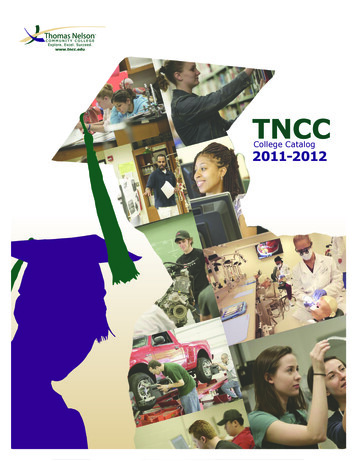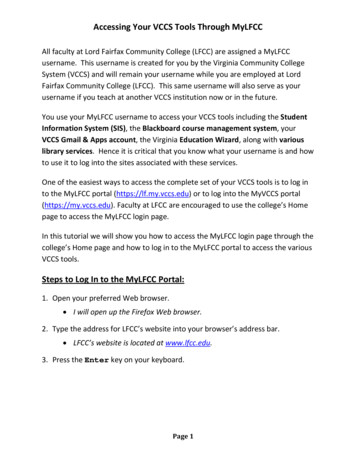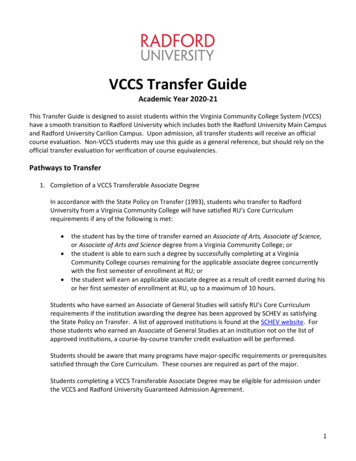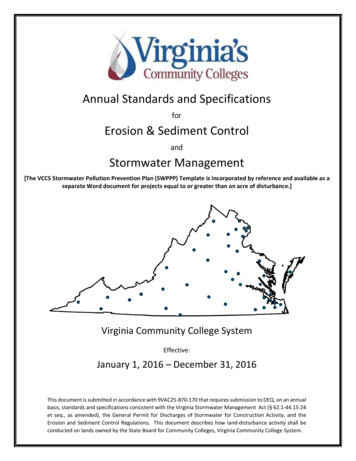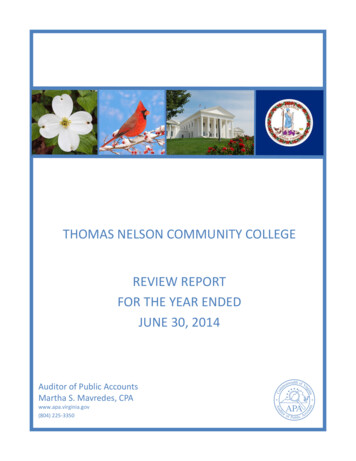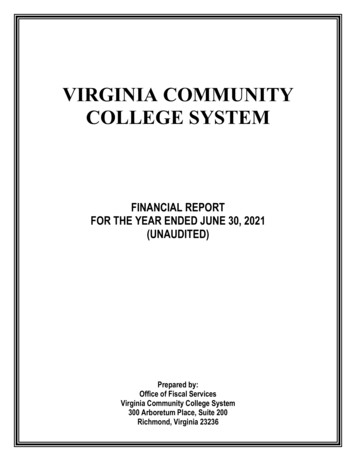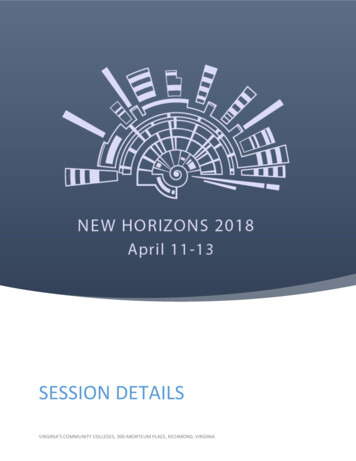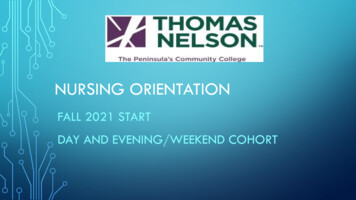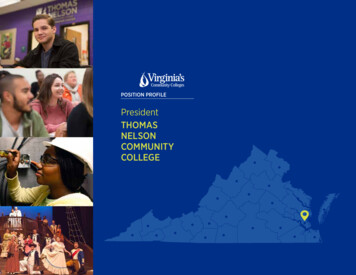
Transcription
POSITION PROFILEPresidentTHOMASNELSONCOMMUNITYCOLLEGE
VCCS MISSION STATEMENTA BRIEF HISTORY OF VCCSWe giveeveryone theopportunityto learn anddevelop theright skillsso lives andcommunities arestrengthened.Virginia’s Community Colleges have a 50-year trackrecord of educational excellence and innovation toserve the needs of our citizens and strengthen thecommonwealth’s economy.A MESSAGE FROM THE CHANCELLOROF VIRGINIA’S COMMUNITY COLLEGESVirginia’s Community Collegesseek creative, hard-workingleaders, especially at thepresidential level, dedicatedto our mission of helpingindividuals obtain the skills andknowledge they need to elevatetheir lives and communities.When Virginia’s General Assembly established theVirginia Community College System in 1966, theneed for a comprehensive system was well known.Over the two decades after the end of World WarII, leaders in government, business, professionalsectors, and academia had called for a newapproach to providing educational opportunity.Our diverse array of institutionsincludes some of the nation’slargest community colleges, some of the smallest, andeverything in-between. Whether you’re seeking your firstcollege presidency, or your next success leading a largerinstitution, we have a myriad of options for you to consider.And what’s on campus is only part of what we have to offer.WHERE WE AREWith 23 colleges on 40 campuses across theCommonwealth, Virginia’s Community Collegesoffer many educational choices.Virginia is a growing and diverse state. From majesticmountains, to sunny shorelines, to unmatched history, thecommonwealth often sits atop national listings for the bestplaces to work, live and play. And Amazon’s recent decisionto locate a headquarters here is a high-profile reminder of ourgrowing and exciting business climate.WHERE WE ARE GOINGVirginia’s Community Colleges were created in1966 to address Virginia’s unmet needs in highereducation and workforce training. The newestStrategic Plan, Complete 2021, contains a singlegoal: to triple the credentials students earn inacademic and workforce areas.Community college presidents in Virginia operate with agreat deal of latitude and are accountable for seeing that theirinstitutions are difference-makers in their service regions. Ifyou crave the challenge of changing lives, and inspiring teamsof talented, like-minded professionals, then I would encourageyou to apply today.Sincerely,Glenn DuBois2
VCCS ENROLLMENTVirginia’s Community Collegesare open access institutions,serving individuals, families,businesses, and communitiesacross the commonwealth.We take great pride in theincredible diversity of ourcollective students bodies,from high schoolers tononagenarians; from thefirst in their family to attendcollege to an increasingnumber of veterans andmilitary-related students;along with individuals fromevery race and ethnicity.Enrollment vs Virginia PopulationEnrollment by Student Age17 16%25 31%2017-2018 ENROLLMENTPOPULATION OF VIRGINIA234,369Over 8.47 Million18-2452%VCCS Enrollment by Gender, Race, and ity43%57%MINORITYALLOTHERSTUDENTSWhite130,632Black or African ican Indian or Alaska Native803Native Hawaiian or Other Pacific Islander 707Two or More Races10,553Unknown/Not Specified2,6483
ABOUT THE COLLEGEThomas Nelson Community College is the fifth largest of 23Virginia community colleges. Thomas Nelson CommunityCollege (TNCC) provides financially accessible, high-quality,comprehensive educational programs and services to the VirginiaPeninsula. Thomas Nelson proudly serves the cities of Hampton,Newport News, Poquoson, and Williamsburg and the counties ofJames City and York.The College enrolled its first 1,232 students in fall 1968 at itsHampton campus, becoming the first community college in the region. Thomas Nelson received its initial accreditationfrom the Southern Association of Colleges and Schools Commission on Colleges (SACSCOC) to award the associatedegree in 1970. The College began leasing space at the Busch Corporate Center in 1999 to provide a campus in GreaterWilliamsburg. In 2009, the College officially established the Historic Triangle campus to serve students in the GreaterWilliamsburg area. In addition to campuses in Hampton and Williamsburg, the College also offers programs and servicesat four satellite centers in Hampton, Newport News and Williamsburg.Thomas Nelson offers associate degree programs to prepare individuals for transfer, as upper-division students, tobaccalaureate degree programs at four-year institutions, as well as associate degree programs to prepare individualsas technical and paraprofessional workers in high-demand careers. In addition, Thomas Nelson provides numerousworkforce programs designed to provide industry-recognized training in healthcare, IT, cybersecurity, culinary, andmanufacturing and construction trades.COMMUNITYThomas Nelson serves a region renowned for its history and culture. The Peninsula is part of the Virginia Beach-NorfolkNewport News Metropolitan Statistical area, which has an estimated population of 1.7 million.The Peninsula is home to a diverse group of industries that drive economic growth and workforce needs in the area,including a large military presence, which contributes to 40% of the region’s economy. In addition, the Peninsula is hometo Fortune 500 companies, including Huntington Ingalls Industries, the largest military shipbuilder in the U.S, and theDollar Tree. The NASA Langley Research Center is part of the region’s rich aerospace history and continued strengthtoday. The area’s other industries include healthcare, advanced manufacturing, and growing technology needs.Tourism officials describe Hampton, where the main campus is located, as “a city with an old soul and a youthful4
STUDENT SNAPSHOT 11,588 students served in2018-2019 credit students 59.4% are women 35.4% 25 years old or older 50.2% are minority in termsof race/ethnicity 63% are traditionallyunderserved populations,as defined by student race/ethnicity, first-generationstatus, and income levelenthusiasm.” Williamsburg is home to the nation’s second oldest higher education institution and attracts millions oftourists each year to its historic neighborhoods. The HamptonRoads region has several higher education institutions and athriving music scene. The region also boasts a number of publicbeaches and offers a variety of recreational activities, fromgolfing and fishing to parks and museums. Truly, the region is agreat place to work, live and play.STUDENT LIFEIn Academic Year 2018-2019, Thomas Nelson served 11,588students (unduplicated headcount) in credit instruction. TheCollege serves a highly diverse region, and its student bodyclosely reflects the demographics of the greater community.The College offers comprehensive student support servicesto ensure student success, whether the individual is workingtoward a bachelor’s degree or training for career advancement.Thomas Nelson provides academic advising, tutoring, careerservices, and a math emporium for students in developmentalmath. Additional programs like TRiO Student Support and GreatExpectations ensure that boundaries beyond our students’ control do not stop them from succeeding. Thomas Nelson’sCare Team provides a bi-annual Pop-Up Clothes Closest that distributes gently used clothing and a Food Pantry thatopens daily in partnership with the Virginia Peninsula Foodbank to serve our students’ basic needs beyond the classroomfor free.Thomas Nelson is honored to serve active-duty, veteran and dependent military classifications. In 2018-2019, 24.1%of Thomas Nelson credit students indicated a military affiliation (e.g., active-duty, veteran, military spouse, or militarydependent).The College provides our veterans with more opportunities to succeed, including a Veteran Services Office and Center,military transition services through the College Career Center, credit classes on local military bases, VA approval forhigh-demand short-term workforce development certificates, and certified full-time Thomas Nelson staff to provide VAeducation benefits on-site.5
ACADEMIC PROGRAMSThomas Nelson offers numerous short-term, two-year and collegetransfer programs creating many pathways to a rewarding career.Programs are available in the following career pathways:Arts and HumanitiesBusiness & FinanceCybersecurity, Computer Science and ITEducation & Social ScienceEngineering & ScienceHealth & WellnessManufacturing and MechanicsPublic Safety & LawDrones, Transportation & LicensingEach pathway is under a specific academic division and is led by adean or department chair, depending upon size. Thomas Nelson’sacademic divisions include Arts, Business, Humanities and SocialSciences; Public Safety, Allied Health and Human Services; andScience, Technology, Engineering and Mathematics.Academic Affairs at Thomas Nelson works in partnership withemployers across Hampton Roads to identify high-demand careerfields. Employers in industries such as healthcare, shipbuilding,advanced manufacturing, skilled trades, hospitality and moreserve on various advisory boards, giving counsel and supportinginnovative educational experiences for Thomas Nelson students.The College is also known for its transfer programs. Known inour community as 2-plus-2 programs, our transfer offeringsaward students who complete an approved transfer degree the equivalent of the first two years of an undergraduatedegree. In addition, Thomas Nelson has several articulation agreements as a result of partnerships with regional four-yearinstitutions and employers in the area. Partners at Virginia’s four-year institutions and our own graduates regularly tell ushow well prepared Thomas Nelson students are when they transfer to pursue their bachelor’s degrees.6
WORKFORCE DEVELOPMENTThomas Nelson Community College Workforce Developmentis dedicated to creating customized programs that successfullydevelop and enhance the Virginia Peninsula’s workforce throughtailored training for individuals and organizations, small andlarge. Workforce Development also customizes courses tomeet the needs of regional organizations, providing just-in-timeservices. Thomas Nelson has partnered with major employersacross the region, including Ferguson Enterprises, CanonVirginia, Inc., and Newport News Shipbuilding, to create tailoredprograms and credentials to prepare their workforce for the nextlevel of transformation at their organizations.To help sustain a highly-skilled workforce on the VirginiaPeninsula, Thomas Nelson Workforce Development maintainsstate-of-the-art full-service training facilities in Hampton at theregion’s Peninsula Workforce Development Center (PWDC)and the Center for Building and Construction Trades. Trainingat these Centers replicates real worksites of apartment andbuilding maintenance, HVAC, electrical systems, welding,machining, marine electricians and plumbing technicians.FACULTY AND STAFFThomas Nelson’s faculty, staff and administrators, who totalroughly 750, are driven by these core values: students’ first,educational excellence, community responsiveness, integrity,diversity, and mutual respect.Thomas Nelson has about 100 full-time teaching faculty and more than 300 part-time faculty. Full-time faculty servesas department chairs, club advisors, and faculty mentors to their colleagues and their students. Thomas Nelson facultyare dedicated to their students, and their experience ranges widely from distinguished specialists with over 30 years ofteaching and research to vibrant young scholars just completing their master’s degrees or doctoral studies.LEARNING RESOURCESThe Learning Resources Center advances the College’s mission through a comprehensive, readily accessible collection ofinformational materials, instructional technologies, and other academic support services that meet the educational needsof students, faculty, and staff. The Learning Resources Center provides a supportive environment, tools, and expertisethat nurture and enhance the teaching and learning process for the entire college community.Thomas Nelson’s Learning Resource Centers are located on campuses in Hampton and Williamsburg. In addition, LRCstaff are available online to support distance learners, staff and faculty needs.7
The Hampton campusis home to the 470-seatDr. Mary T. ChristianAuditorium. Thomas Nelson SatelliteCampus: Southeast HigherEducation Center inNewport News. Regional WorkforceCenters: Peninsula WorkforceDevelopment Center inHampton Center for Building andConstruction Trades atGoodwill in Hampton Thomas Nelson WorkforceCenter in Williamsburg Replacement Building: At an approved projectcost of 38 million, thenew three-story, 75,000square-foot buildingwill house 27 totalclassrooms, includinga Math Emporium andCybersecurity laboratoryFACILITIESThomas Nelson has two campuses, one in Hamptonand the Historic Triangle Campus in Williamsburg.The General Assembly provided funding for theplanning and design of a new building as replacementfor Diggs, Moore, and Harrison halls. In 2018, RRMMArchitects was awarded the project, and in 2019 theThomas Nelson Board, the Art and Architectural ReviewBoard and the State Board for Community Collegesapproved the schematic design for the replacementbuilding.BUDGET AND FINANCEThomas Nelson is financially healthy with a combined state and local budget of approximately 42 million. The mainsources of income for the College are student tuition and state appropriations. Facing significant budget constraintsbecause of reduced tuition revenue and state funding, Thomas Nelson leadership made two painful rounds of staffreductions in 2017 and 2019, along with significant reductions in the operating budget. Since then, the financial conditionof the College has steadied, and the projected outlook is stable.ACCREDITATIONThomas Nelson Community College is accredited by the Southern Association of Colleges and Schools Commission onColleges to award the associate degree. Contact the Commission on Colleges at 1866 Southern Lane, Decatur, Georgia30033-4097 or call (404) 679-4500 for questions about the accreditation of Thomas Nelson Community College.8
TNCC EDUCATIONAL FOUNDATIONThe Thomas Nelson Community CollegeEducational Foundation is a nonprofit 501(c)(3)corporation founded to generate support forThomas Nelson Community College by raisingfunds, increasing visibility, and strengtheningpartnerships between the College and state andlocal communities.The Educational Foundation was establishedin 1979 to raise private financial support toaugment programs and existing servicesand to attract funds to develop new coursesand programs. The Foundation’s 15-memberboard consists of volunteers who representthe leadership of the Peninsula communityand provide oversight responsibility to theFoundation. Funds are used to provide varioustypes of support, including scholarships, facultydevelopment, program support, and capital needs. The Foundation supports well over 50 scholarships and a wide rangeof academic programs.The Foundation has a direct impact on our students’ success and program areas, thanks to generous individual, corporate,and foundation partnerships. Donations to the Educational Foundation support scholarships, help first-generation collegestudents receive access to academic support services, provide emergency funding for students, faculty and staff indistress, support innovative programs and more.9
REPORTING RELATIONSHIPSThe President of the College reports to the Virginia CommunityCollege System Chancellor and is also advised by the LocalCollege Board. Thomas Nelson’s Local Board is a 14-member bodyappointed by the localities of the region the College serves.Currently, the President’s Cabinet consists of two directors, Directorof Human Resources and Director of Institutional Research &Effectiveness, and four Vice Presidents: Vice President of AcademicAffairs & Workforce Development, Vice President of Finance andAdministration, Vice President of Institutional Advancement, and theVice President of Student Affairs.Among the College’s core values are mutual respect and shared governance. In that vein, the College values everyone’scontributions, encourages the sharing of ideas, and commits to equitable treatment. Thomas Nelson acknowledges ashared responsibility for institutional success and improvement and commits to shared decision-making characterizedby broad participation, openness and teamwork. The College’s four constituency groups that represent members of theCollege community and work toward shared governance are Faculty Senate, College Support Staff Association, Council ofMid-Level Managers and Student Government Association.10
THE OPPORTUNITYTNCC is excited to begin its search for its nextpresident and has identified priorities and keycharacteristics for the next leader.VISION: The next president will be a skilled strategistable to envision, propose, and implement change.She/he also will have a proven record of buildingrelationships and engaging the community and otherexternal partners in improving student access andsuccess.TRANSFORMATIONAL: The president will developand maintain strong leadership teams; seekcontinuous improvement; and foster positive changethrough transparency, integrity and collaboration.PARTNERSHIPS: This leader will build dynamic andsuccessful partnerships with highly diverse stakeholders and advance fundraising efforts.OPERATIONS: Internally, she/he will ensure operational efficiency, fiscal strength, and college affordability, while ensuringthe sustainability of programs to meet the needs of the students and community at large.MISSION-ORIENTED: An understanding of the mission and goals of a comprehensive community college in the 21stCentury and appreciation for urban colleges are essential characteristics, along with a clear commitment to instruction,student access/success, revenue generation, community partnerships, diversity, and strategic leadership.SUCCESS FACTORS: The local College Board and college community have identified the following organizationalpriorities for the college in the next 3-5 years: Improve access and enrollment to college courses, programs and servicesIncrease student success rates (retention, completion and transfer)Strengthen the financial position of the collegeExpand Workforce Development and accelerated Career Readiness ProgramsEstablish innovative approaches and new technologiesMultiply partnerships11
HOW TO APPLYQUALIFICATIONS FOR PRESIDENTTo accomplish the above, qualified candidates must have an earned doctorate and demonstrated successful seniorexecutive experience at the highest levels. Previous experience must include significant responsibility for programs,budgets, personnel, facilities and other appropriate administrative duties. The successful candidate must have provenleadership abilities along with excellent communications skills, a strong belief in a collaborative administrative style aswell as a servant leadership perspective. She/he must also have a broad vision for the College together with the skills andenergy for implementation and the demonstrated ability to work with business, industry, government and the communityat large.APPLICATION INFORMATIONThe search will remain open until the position is filled; however, to be considered for the initial screening, candidatesshould submit the below application materials by July 6, 2020, through our applicant portal at http://www.vccs.edu/careers.A complete application packet will include a cover letter, résumé/CV, and one-page statement of leadership philosophy.The leadership statement should address the applicant’s perspective on strategic risk-taking, making change, and howto fund and grow programs for the future. Additional information about the College, its community, the position, andapplication procedures can be found at: sThe expected start date for the presidential appointee is January 1, 2021, or as soon as is practical thereafter. The salaryrange for this position is 157,449- 193,698. Questions may be directed to vwaldron@vccs.edu or ckimbrough@vccs.edu.The Virginia Community College System is committed to fostering, cultivating, and sustaining a culture of diversity and is an Equal Opportunity/Affirmative Action Employer. The VCCS encourages applications from women, minorities, veterans, and those with disabilities in our effort to reflectour diverse society.12
Thomas Nelson's faculty, staff and administrators, who total roughly 750, are driven by these core values: students' first, educational excellence, community responsiveness, integrity, diversity, and mutual respect. Thomas Nelson has about 100 full-time teaching faculty and more than 300 part-time faculty. Full-time faculty serves
